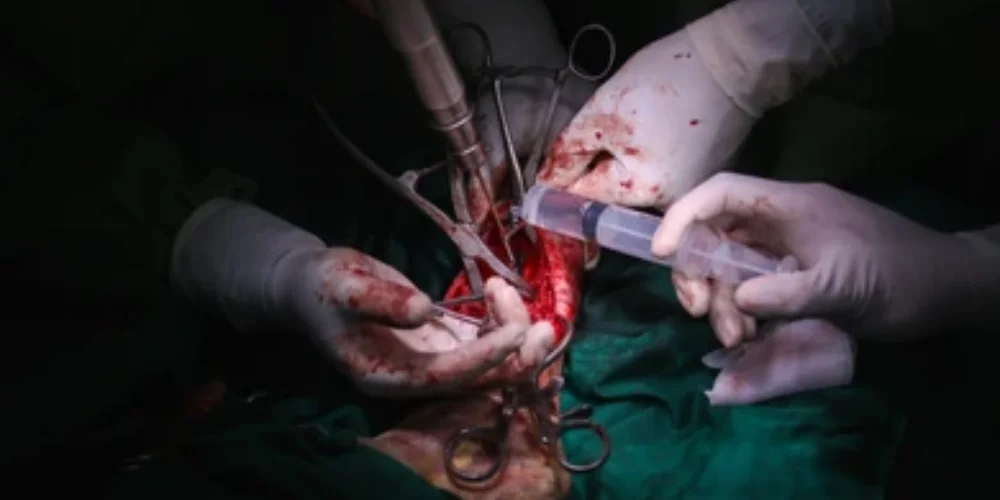Hysterectomy For Cancer Surgery
Specialized Care for Uterine, Cervical, and Ovarian Cancers
Hysterectomy for cancer is the removal of the uterus, and in certain cases other reproductive organs, for treating cancers, such as cervical, uterine, and the ovarian cancer. This procedure is an essential component of the treatment program for women who have been diagnosed with cancers of the gynecological type. Here at Chirayu Super Speciality Hospital, our highly skilled surgical team offers individualized care with the most recent methods, such as minimally invasive and robotic-assisted surgery for the best results of our patients.

What is Hysterectomy for Cancer Surgery?
A cancer-related hysterectomy surgical procedure to eliminate the uterus and sometimes, the cervix the fallopian tubes, ovaries and the surrounding tissues, based on the stage and type of cancer. The procedure is usually advised as a primary therapy for cancers that haven’t expanded outside of the reproductive organs. The procedure is performed by a variety of techniques such as abdominal, vaginal or robotic-assisted techniques.
Who Performs Your Surgery?
The hysterectomy to treat cancer will be handled by a highly experienced Gynecologic Oncologist who is specialized in cancer surgery. Our surgeons have years of experience in performing complicated hysterectomies. making sure that each aspect of your procedure is executed with precision and attention to detail. They work with a multidisciplinary group, including radiologists, oncologists and pathologists, to offer complete cancer treatment that is specific to your requirements.
Indications for Hysterectomy for Cancer Surgery
- Uterine cancer : Removal of the uterus is usually required for treating cancer of the uterine line (endometrial cancer).
- Cervical Cancer : A hysterectomy could be necessary for treating cervical cancer at an early stage.
- Ovarian Cancer : In some instances, elimination of the uterus together with the ovaries and fallopian tubes, are an aspect of the treatment plan.
Prevention Surgery women who have a higher risk of developing gynecologic cancers due to genetic causes may choose to undergo a hysterectomy for an preventive measure.
Types of Hysterectomy for Cancer
- Total Hysterectomy : It involves taking out the cervix and uterus. It is by far the most commonly performed form of hysterectomy to treat cancer treatment.
- Radical Hysterectomy : A more complex surgery which removes the uterus cervical cervix and the upper portion of the vagina, as well as the surrounding tissues. It is generally used to treat more advanced cervical cancer.
- Subtotal or Partial Hysterectomy : It involves an operation to remove the lower portion of the uterus. It leaves the cervix in place. This method is less popular for cancer treatment.
- Hysterectomy with Bilateral Salpingo-Oophorectomy : This involves an elimination of the uterus the ovaries and fallopian tubes. It is usually advised for cancer of the ovary or as a preventative procedure for women at a high risk.
Symptoms Indicating the Need for Surgery
- Abnormal vaginal bleeding or discharge.
- Pelvic pressure or pain.
- Fatigue or weight loss that is not explained.
- Consistent abdominal swelling or bloating.
- Changes in bladder or bowel habits.
Diagnosis Leading to Hysterectomy for Cancer
It is a decision that a woman makes to have a hysterectomy procedure for cancer depends on a verified diagnosis of gynecologic tumors, usually based on an examination of the pelvis as well as scans (like the ultrasound or CT scan or MRI) as well as biopsies and tests for blood. The surgeons carefully evaluate the extent of cancer before discussing the best surgical option together with patients.
Treatment Process
Hysterectomy to treat cancer is generally done under general anesthesia. The procedure may last for a long time dependent on the extent of the operation. The procedure is performed via an abdominal incision that is open or vaginally, or by using minimally invasive methods like robotic surgery or laparoscopy. The procedure choice is based on a variety of factors, including the stage and type of cancer being treated, anatomy of the patient and general health. Post-operative care is crucial for healing and includes controlling discomfort, preventing infection, and slowly resuming normal activities.
Care and Recovery After Surgery
The recovery process following hysterectomy for cancer requires a hospitalization for a couple of days then a period of recovery at home. Patients can suffer from fatigue, pain, as well as changes in bowel and bladder function after they heal. It is crucial to follow the post-operative care program that is provided from the surgeon’s team that includes the treatment of wounds as well as guidelines for physical activity and follow-up appointments to track the healing process and identify any indications of complications. Support for emotional and psychological issues is essential during this time since surgery could have a major impact on the woman’s life.
Advantages of Choosing Our Surgery Services
Comprehensive Cancer Care
We provide a multidisciplinary approach, ensuring all aspects of your cancer treatment and recovery are managed with expertise.
Advanced Surgical Techniques
Our use of the latest surgical methods, including minimally invasive options, helps to improve outcomes and speed up recovery.
Personalized Support
We offer personalized care and support, addressing your specific needs and providing resources to help you through your treatment and recovery.
What Our Patients Say
Read about our patients positive experiences and how Chirayu Super Speciality Hospital has positively impacted their health and well-being.


I’m grateful for the comprehensive care provided by Chirayu. The entire process, from surgery to recovery, was managed with expertise and compassion.


The skilled surgeons and caring staff at Chirayu made my hysterectomy experience as smooth as possible. I felt supported every step of the way.


My hysterectomy for cancer went smoothly, and the recovery was quicker than I expected. I’m grateful for the excellent care provided.


The care I received during my hysterectomy was exceptional. The team at Chirayu made sure I was informed and supported throughout.
Meet Our Medical Specialists
Our expert team specializes in hysterectomy for cancer, offering advanced, personalized surgical care with a focus on optimal patient outcomes.
Frequently Asked Questions
Here, we provide answers to some of the most commonly asked questions to help you better understand about our surgery services. If you have any additional questions, please do not hesitate to contact us.
A hysterectomy for cancer is a surgical procedure to remove the uterus and possibly other nearby structures to treat gynecologic cancers.
Risks include infection, bleeding, changes in hormone levels, and potential impacts on sexual health and urinary function.
Benefits include effective removal of cancerous tissues, potential reduction in cancer recurrence, and relief from cancer-related symptoms.
Candidates include women diagnosed with cervical, endometrial, ovarian, or uterine cancers, or those with precancerous conditions.
Types include total hysterectomy, total abdominal hysterectomy, total vaginal hysterectomy, laparoscopic hysterectomy, and radical hysterectomy.



